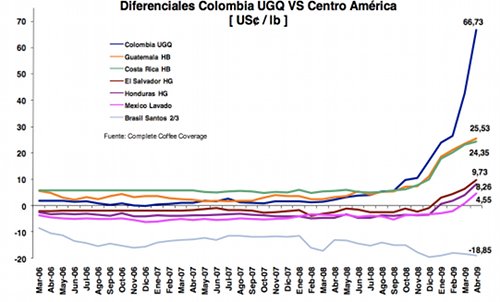Sorry if this is a little heavy compared to the normal blog post I produce but I’ve been due one for a while.
This is going to be a tough one to do, so please keep with me, please if I make a mistake this is out of my comfort zone of knowledge pull me up and tell me where I’m wrong, but this has been kicking around my head for a number of weeks. I’ve also been reading everything I can and asking silly questions to all the people I know (thank you in particular to Stephen Hurst at Mercanta and to Juancarlo of Virmax in Colombia for answering all my stupid questions).
For years the coffee industry has tried to make coffee prices a bit too simple. So numbers like $1.31a lb for fairtrade, 8 cents a lb premium for organic market price of $1.36 a lb for commodity coffee have been common place. I along with many others have been as guilty as anyone else of doing this. The grey area has always come with specialty coffee (minus cup of excellence I guess, if this got any more transparent then you wouldn’t be able to see it) here relationship prices can be anywhere that the market decides but tend to be normally above and beyond what would be considered the norm. Also FOB (free on board prices) never tell the full story, was there pre finacing, is there a long term agreement in place etc)
We have made a commitment from day one of Has Bean being a glimmer in my eye, to pay the very best prices we can, while making sure the consumer gets a great deal too. For too long a premium on coffee without a premium in the cup has been what was expected in the coffee world (and to an extent still is), and I’m thinking of fairtrade rainforest alliance etc, this is not a premium but a charity donation that is not sustainable and for the long term, and for sure has been a short term fix to a terrible problem, but without foundations of a longer term solution that needed to be laid. This is where the relationship prices kick in. I think there are many others out there that have done far more admirable work thatn us, but as the small fish we are we have the goals and ambtions to emulate them.
But something I didn’t understand really happened in the market was something called differentials. These are country premiums on top of the commercial market price for any grade of arabica coffee. So any one will be able to achieve this price and there will be lots of people offering to take it off there hands for these prices with no regard for quality. To give you an idea of the prices take a look below for April (Colombia got even higher afterwards) (at time of writing the market price for commercial coffee is £1.36 so all these prices are that plus the differential)
Colombia 66.73 Cents
Guatemala 25.53 Cents
Costa Rica 24.35 Cents
El Salvador 9.73 Cents
Honduras 8.26 Cents
Mexico 4.55 Cents
Brazil -18.85 Cents
I don’t know the answer to this question,but it does make me think that if fairtrade is pitching at $1.31 minimum price do they pay differentials too? And is this across the board differentials?
The other thing I’ve since found out that you would think producers would welcome higher prices. But the very reason the differential has gone up is due to lack of supply. So the higher prices are just cushioning the blow of lower yields, and there is a huge negative of not being able to service long term customers with there requirements with the reduced stocks. This also has a long term damage of customers looking at other origins a little harder
I also questioned was the incredibly low Brazil price. But much of this is down to the huge sizes of the farms and the mechanised nature of these farms. But it seems very low even for commercial coffee I wonder how it can be profitable at this very low cost.
But the upshot from all of this was commercial coffee prices are having less and less to do with speciality coffee. We have been far more effected by the strength of the dollar against the pound that any other factor. When you start high these things tend to not have so much of a bearing, and longer term relationships are most important at times of highs as well at the times of lows and it should and is a two way street.
Interesting times to be involved in coffee.




Something I’m not entirely clear on – do the differentials only apply to coffee traded on the commodity market?
Who sets these levels?
As far as I’m aware David it is only on Commodity coffee. The other coffees tend to have above and beyond premiums build in by there nature. The differential is the very cheapest you will get that coffee in the market place.
Again the prices are set by the markets so a market within the commodity market (as I understand it)
Thanks for the explanation Steve!
I run the espresso club at work (which mainly means keeping us stocked with beans) and due to price constraints have had to use fairly cheap coffee. For a while now I’ve had a feeling I should switch to fairtrade, if only for image reasons, despite the fact that almost without fail all fairtrade coffee I’ve tasted has been inferior.
At home I generally roast and drink Hasbean. I know you guys pay a good price for a good product so I have no reason to choose my coffee based on some fairtrade stamp. As a result, I get the best coffee there is, and my conscience is clear.
In most cases fairtrade seems to be a half-arsed attempt by mediocre suppliers to prove that they aren’t being complete bastards. I view it as a PR stunt that, as a side effect, happens to be somewhat good for the supplier too.
While I’m at it: for some reason most people seem to be unable to distinguish between different ‘good’ choices like organic, fairtrade, local produce (I know, a rare thing in your business!) and instead take them all to mean ‘good quality’. But the best coffee, or any other product, is one where the producer’s main goal is quality, not ticking the right boxes and getting a stamp for the effort.
Great work guys! Keep it up!
Some comments,
The low price on brazilian coffee is not that akward knowing that their coffee isnot produced on high altitude, therefore their quality is less, but this gives them also the opportunity to work totaly mechanized. On hilly slopes this is not possible.
My experience with this diffirential is exactly the same. I work for a small holder cooperative in peru, chanchamayo and we see that conventional coffee at this moment are sold for better prices then fair trade. Because they do not adabt to this diffirential.
Your opinion on charity is not entirly true. Thanks to a minimum price which fair trade gives us our members are not forced to abandon their fields when prices are so low that even for production can not be paid. On the other hand when prices are good fair trade only costs a lot of work for nothing.
But this is not everything they also help us making plans to improve quality and productivity and to reduct harm to the environment. This is not just fairtrade but most labeling organization.
We would rather work just with importers or rather toasters, but the current way of bussiness leaves us with no other way then work with labels. Because the improve quality and productivity you need money. We do not have this capital to invest in education and agricultural inputs.
I hope you can do something with my input
Dear Steve,
thank you for your interesting elaboration! May I ask where you got the data on the country price differentials from? I am currently looking for a data source on this matter and would be very grateful if you could help me along.
Best regards,
Jana
This was from the time, it changes all the time, but was from a UK importer